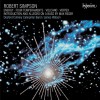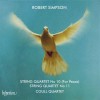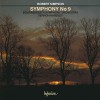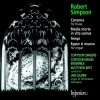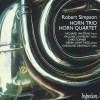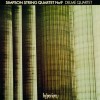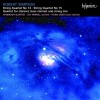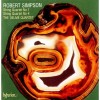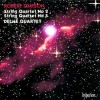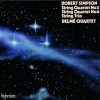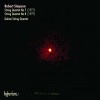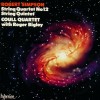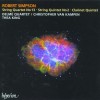传记
Robert Wilfred Levick Simpson (2 March 1921 – 21 November 1997) was an English composer and long-serving BBC producer and broadcaster.
He is best known for his orchestral and chamber music (including 11 symphonies and 15 string quartets), and for his writings on the music of Beethoven, Bruckner, Nielsen and Sibelius. He studied composition under Herbert Howells. Remarkably for a composer who was still alive, a Robert Simpson Society was formed in 1980 by individuals concerned that Simpson's music was unfairly neglected. The Society works to bring Simpson's music to a wider public by sponsoring recordings and live performances of his work, by issuing a journal and other publications, and by maintaining an archive.
Simpson was born in Leamington, Warwickshire. His father, Robert Warren Simpson, was a descendant of Sir James Young Simpson, the Scottish pioneer of anaesthetics; his mother, Helena Hendrika Govaars, was the daughter of Gerrit Govaars, founder of the Leger des Heils, the Dutch arm of The Salvation Army. Simpson studied at Westminster School. He was intended for a medical career and studied in London for two years before his determination to be a musician gained the upper hand. A conscientious objector in World War II, he served with an A.R.P. mobile surgical unit during the London Blitz, while taking lessons from Herbert Howells. Howells persuaded him to take the Durham University Bachelor of Music degree and in 1952 he gained the further degree of Doctor of Music from that university, the submitted work being his First Symphony. After the war Simpson lectured extensively and founded the Exploratory Concerts Society; in 1951 he joined the music staff of the BBC and became one of its best-known and most respected music producers, remaining with the Corporation for nearly three decades. Simpson was a great champion of Havergal Brian's music and under the BBC's auspices he produced many broadcasts featuring Brian's works. These included the mammoth "Gothic" Symphony in 1966 under Sir Adrian Boult, and in 1973 the 28th Symphony under Leopold Stokowski who, at the age of 91, was premiering a work written by a 91-year-old composer.
Simpson married Bessie Fraser in 1946; she died in 1981 and the following year he married Angela Musgrave, a fellow BBC employee and relative of composer Thea Musgrave.
In the latter part of his career as a BBC producer Simpson frequently clashed with the management of the organisation. In the 1970s he was one of those – Hans Keller and Deryck Cooke were others – who started the (unsuccessful) revolt against the report Broadcasting in the Seventies and its plan for "generic broadcasting" (i.e. separate networks for pop, classical and speech). A decade later Simpson was energetic in his opposition to a cost-cutting reorganisation that ultimately proposed the decommissioning of five of the eleven BBC orchestras. During the ensuing musicians' strike (which caused the cancellation of the first several weeks of the 1980 BBC Promenade Concerts) Simpson chose to disregard BBC staff regulations and discuss the matter with a national newspaper; he then resigned from the Corporation, publicly alleging a "degeneration of traditional BBC values in the scramble for ratings" (Hans Keller later described these criticisms as "demonstrable fact"[1]) . Had Simpson remained silent for a few more months he would have been able to retire with a full pension, but his feeling was that such a course would have compromised his principles. Abominating the ethos of Thatcherite Britain, in 1986 he moved to Ireland, settling on Tralee Bay in Kerry. In 1991 he suffered a severe stroke during an English lecture tour, which caused damage to the thalamus that left him in debilitating pain for the remaining six years of his life. He died in Tralee in 1997.
Simpson's other great passions were astronomy (he was a member of the British Astronomical Association and – unusually for an amateur – was made a Fellow of the Royal Astronomical Society) and pacifism, specifically addressed in the title of his Tenth String Quartet, For Peace. He was awarded many honours, including the Carl Nielsen Gold Medal, 1956 (for his book Carl Nielsen, Symphonist, published 1952), and the Medal of Honor of the Bruckner Society of America, 1962. He refused appointment as a Commander of the Order of the British Empire.







